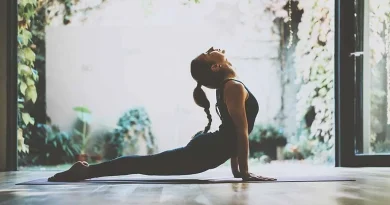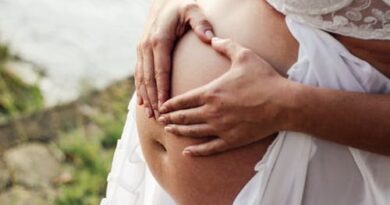Rosario Dawson on Recognizing Anxious Feelings—and How She’s Prioritizing Her Emotional Health
Rosario Dawson on Recognizing Anxious Feelings, and finding a therapist—are just a few of the ways this busy actor finds balance.
Rosario Dawson is a self-professed workaholic. She began working before she could drive a car—and hasn’t stopped since. At 15, she spot to director Larry Clark on the stoop of the building where her family live in New York City’s Lower East Side and was pretty much cast on the spot in the cult classic Kids. From there, Rosario’s career skyrocketed, and she has spent the past 25 years appearing in more than 50 movies and countless TV shows.
While many people have been hunkering down during the pandemic, Rosario has been as busy as ever. This past November, the 41-year-old made a surprise appearance—to the delight of fans—in The Mandalorian on Disney+ as Ahsoka Tano. Shortly after that, it was announced Rosario’s character would be getting her own eponymous spin-off. The actress is also one of the judges on TBS’ Go-Big Show, a talent show where people exhibit their wildest skills. And she’s the co-founder of the sustainable clothing line Studio 189, which quickly pivoted during the pandemic to start producing cloth face masks and continues to support global communities during this difficult time.
The past year has been trying for many people, but there have also been some silver linings. What positives have you found?
Being able to be home has been a silver lining. One of the major things that I did was move back East. I’ve been bicoastal for more than 15 years. I’m in a long-distance relationship, and suddenly not being able to travel made that difficult. So I literally drove a bus with my dad across the country to move. He’s a cancer survivor and felt vulnerable and didn’t want to fly—which is why I drove a 29-foot bus across the country.
Wow! How was that?
It was really good. It actually brought up a lot of stuff for me—about me being a workaholic. I’ve missed a lot of things because I’ve prioritized working. I feel like, in many ways, I’ve been in the passenger seat in my life. Just being so busy will do that to you. There was something about literally driving across the country in the driver’s seat that helped me feel like I was taking control of my life. And I’ve realized working is important, but so is listening to your soul. By 2021, my goal has been to prioritize my wants—not just my needs.
Are you good about prioritizing self-care?
Well, I have an Oura ring [a sleep tracker], and it’s letting me know I am a very good deep sleeper—which is one of the most remarkable genetic wins. Even though I’m still achieving my dreams at 41 and haven’t sent out to pasture, I also know I don’t have infinite energy. I have to take care of myself better so I can keep showing up for who and what I love.
Are there things you’re trying to work on when it comes to your emotional health?
I’m always someone who is trying to look for the rainbow in the clouds. But I also tend to be really tough on myself. I don’t show it on the exterior, but I can definitely marinate in my troubles. I’ve worked really hard to dial that back and live in my gratitude—and express that gratitude even more to my friends and my family. I feel like it’s about being more aware and noticing where my thoughts are going in the moment. I’ve also started noticing when my heart starts racing more and how many times during the day my anxiety is flaring. That’s one of the things that I’ve come to realize about myself in the past few years—I have a lot of anxiety. I honestly always just said, “I’m stressed.”
What’s the difference between stress and anxiety for you?
Well, if it’s just that I have a stressful life and job, or encounter stressful circumstances—I’m just screwed, right? Like, if I am stresse about work, people will say, “Work less!” But that’s not necessarily an option. But if I have anxiety, it’s more about how I am reacting to that stress. I have more control over that. So that’s what I’ve been working on and talking about. I’m in a group-therapy type of conversation with a bunch of friends. We’ve really been there for each other—we hold each other up.
Do you see a therapist regularly?
That’s one thing I’ve put off for years. My daughter has had therapy most of her life through foster care and stuff. I’ve done weekly therapy with her starting at the age of 11. I have had it in my life, but it hasn’t been specific to me and my personal needs. I read my self-help books, and I’ve done weekend programs and [things] like that. I’ve tried to do these major download moments, and then I just go back to my life, but I’ve realized that it’s got to more than just focusing on self-help for a moment. It needs to be a deeper practice. So that’s something I’m going to work on—getting a therapist.
Can you describe the special bond you have with your daughter?
I’m grateful for her development, our maturation, and our connection. She moved in [with me] at 11; she’s 17 now and going to be 18 soon. To have a young person move in with you and to have to really consciously work through triggers and that kind of stuff is a really different thing than being pregnant and having your baby grow up in front of you—to be able to see how we’re getting closer and closer. We are a family, and it’s beautiful.
Had you always thought about adoption?
So, around the age of 5, I found out my dad wasn’t my biological father. That was super shocking to me. I’m Daddy’s little girl. I don’t know my biological father. Apparently, he died in 2011, but I didn’t have a relationship with him. At 5, it was a lot to take in, and I recall thinking, “What if my parents hadn’t met, and I was older, and no one wants to marry my mom because she has an older kid?” I remember vividly back then saying that when I was older I was going to adopt an older child.
With my daughter, I didn’t go to an adoption center or anything like that. My family knows her biological mom, and when we found out she is in foster care, we look for her. It wasn’t even a question; it clearly meant to—she’s my kid. It’s wild to think I manifested this when I was younger.
Switching gears, you’re the cofounder of the sustainable clothing line Studio 189. What inspired you to start that?
My friend Abrima and I met in high school and became closer in our 20s. She worked for all these big fashion houses. And she speaks French and Italian fluently and went to business school at NYU—she is brilliant. She was always moved by the advocacy work I did with different groups—I was on the board of V-Day [a global movement to end violence against women and girls] and the Lower Eastside Girls Club. Finally, she was looking to use her skills in a way that was more in line with her values. I invited her on a trip I went on with V-Day to the Democratic Republic of Congo.
Out of that experience, we ended up starting Studio 189 together—which is a fashion lifestyle brand that produces African and African-inspired content and clothing. [It’s made in Africa.] We are a sustainable and ethical brand and are women-own and Black- and Brown-own. It feels good to know we’ve been able to create this.
Let’s talk about your career. You appeared in the second season of The Mandalorian, and it was just announced your character, Ahsoka, is getting a spin-off. Are you surpris at how excite fans are?
Talk about my dream come true. The Star Wars universe is big, and it’s whimsical, and it’s all these great magical, incredible things. But at the heart, it’s also about family, redemption, and seeking out the light. I love that about being a Jedi. It’s not like you become a Jedi and that’s it for life. You can still go to the Dark Side—you have to choose the light every single day. You have to steadfas in your values and in your purpose so as not to corrupte.
You’ve consistently chosen projects that touch on real issues. Why has that been important to you?
I’ve always sought out stories that humanized the people I grew up with—even if they were stereotypical characters. As a kid, I didn’t see a lot of things that reflected where I was from or the people around me. Storytelling is so vital and important—for our history and our culture. We are in a major culture war right now—there is talk of who is important and who is not. Some want to “go back to normal” or to “where things were.” But it was unequal for a lot of people. In my opinion, we should be thinking about being more conscious. What can we do to change the inequities that already exist and were exacerbate this pandemic? That is what I hope we can all continue thinking and acting on.




